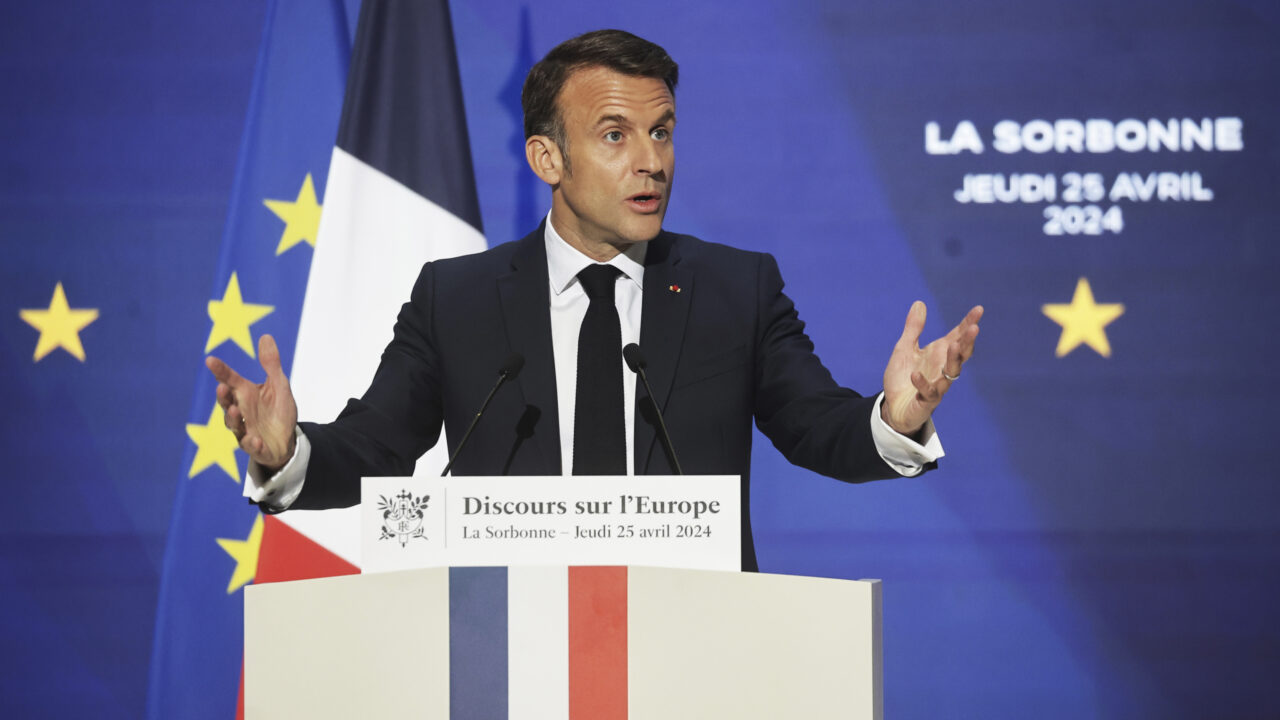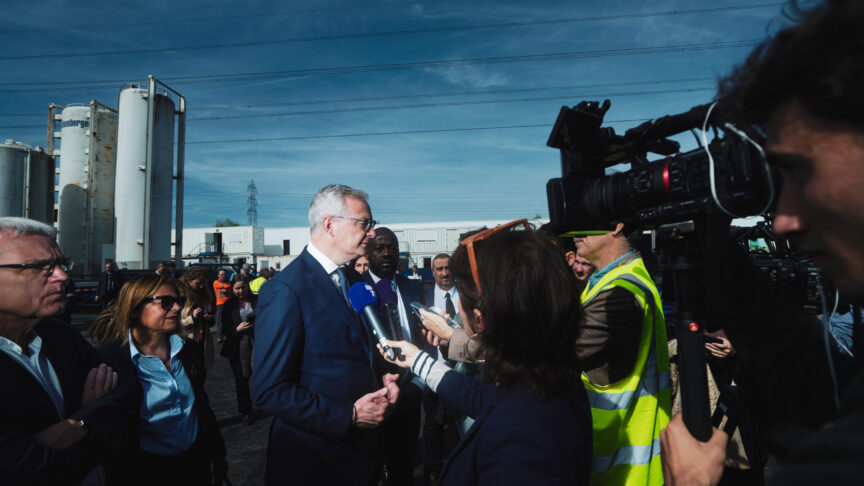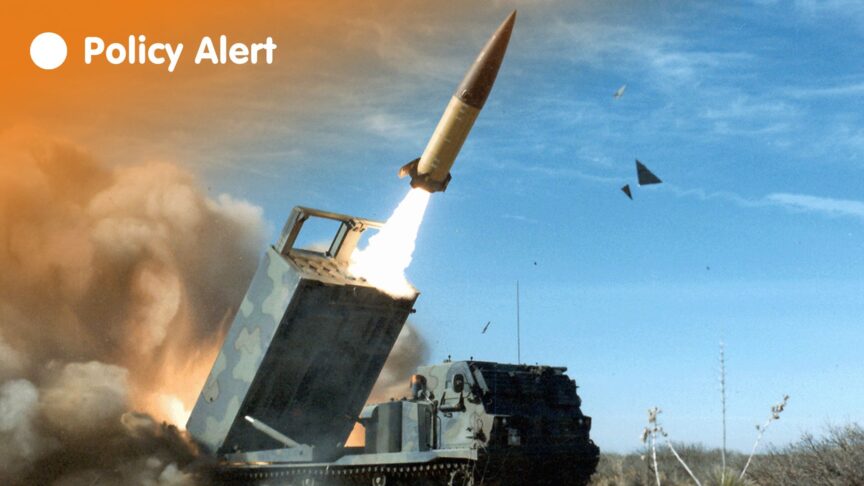The Macron moment
Underlying all the problems that Europe faces in a new age of geopolitical, economic, and climate insecurity is a crisis in leadership. Judging by his recent speech at the Sorbonne, French president Emmanuel Macron could be the politician to supply it, but only if he abandons his standard political playbook
The days of Europe buying its energy from Russia, outsourcing its businesses to China, and relying on the United States for its security are over. The European Union is only mortal and could very well be vanquished at the hands of Vladimir Putin, Xi Jinping, Donald Trump, or its own populist parties.
That was French president Emmanuel Macron’s warning at the Sorbonne on 25 April. With great flair – and at great length – he issued a wake-up call to French citizens, and indeed to all Europeans. It is no exaggeration to say that Europe’s security, prosperity, and culture are under threat.
With the zeal of a convert, Macron argues that the stakes in Ukraine include not only Ukrainians’ future but also the future of Europe: “The condition sine qua non for our security is that Russia does not win the war of aggression it is waging against Ukraine. This is imperative.” Even though the US Congress has finally passed a supplemental aid bill for Ukraine (as well as Israel and Taiwan), Europeans must recognise that the US has only two priorities: “America first, which is legitimate, and China.”
Macron warns that Europeans have entered a new world where raw materials face harder supply constraints, critical minerals are governed by geopolitics, the green transition is growing more urgent, and neither China nor America respects the rules of free trade. And on the political front, he deplores the fact that Europeans are increasingly succumbing to imported culture wars. The more their politics are shaped by narratives produced elsewhere, the less equipped they will be to shape their own future.
True to form, Macron was not short on solutions. Europe’s security risks can be mitigated through a missile-defence initiative, long-range weapons, and improved cyber capabilities, all backed by a “war economy” running on higher military and high-tech production, with financing from the European Investment Bank and mutualised EU debt vehicles. Similarly, Europe’s economic problems demand a new industrial policy, with production targets and ‘buy European’ preferences in strategic sectors such as defence, green technology, raw materials, semiconductors, digital technology, and health care.
Macron’s political genius has always stemmed from his think-tank-like approach to big problems, and his analysis of what ails Europe is a trenchant one. But he suffers from a reverse Midas curse: policies become more controversial by dint of him having embraced them. While the president’s team proudly points out that several of the ideas mentioned in his 2017 Sorbonne speech have since been implemented, Macron himself admits that Europe could have – and should have – gone much further. If he wants to look back in seven years and see a better conversion rate, he will have to adopt a new playbook.
Firstly, Macron must begin to show, not just tell. Though his language on the Ukraine war has been striking, French military aid lags far behind Germany’s. If Macron had really wanted to demonstrate strategic resolve vis-à-vis Russia, he would already have sent French military personnel to assist Ukraine in a non-combatant capacity – as the US and the United Kingdom have done.
Secondly, Macron must get over his ‘Jupiterian’ tendency to see himself as the main character in Europe’s drama. Ideally, he and German chancellor Olaf Scholz would get along well enough to launch ideas in tandem, thus bolstering the idea of a Franco-German motor. But in the absence of a constructive bilateral relationship (for which Germany is equally to blame), Macron should make a greater effort to build coalitions with other leaders, such as Polish prime minister Donald Tusk, Estonian prime minister Kaja Kallas, Spanish prime minister Pedro Sánchez, or Italian prime minister Giorgia Meloni.
Underlying all the problems that Macron identified in his speech is a crisis in European leadership. As an American official recently pointed out to me, Macron is like a (young) King Lear. With just a few years left in his term, and with no majority in parliament, he has come to a clear-eyed understanding of the world too late. Sometimes, Macron appears even to lean into the emptiness, crying into the void like Lear on the heath. It is always easier to be right than to do the hard work of bringing others along with you.
It is always easier to be right than to do the hard work of bringing others along with you
That said, the timing for a ‘Macron moment’ has never been better. Not so long ago, the EU was fundamentally divided between eastern member states that were worried about Russia and looking to the US for protection, and western ones that weren’t. But since his damascene conversion on the road to Kyiv, Macron has proven to be a master at articulating eastern members’ anxieties. If there is anyone who can bridge the EU’s east-west divide, it is him.
Moreover, France’s own nuclear deterrent could be critical for providing reassurances to those countries spooked by the threat of an American withdrawal from Europe if Trump returns to the White House in January. While Macron’s right-wing opponent, Marine Le Pen, has been doing very well in the polls, her antagonistic relationship with the EU and her closeness to Russia have become more glaring weaknesses. If Macron can find a less imperious approach and put his money where his mouth is, he could create a truly durable political base for his ideas. The Macron of seven years ago scarcely could have dreamed of that.
This article was first published in Project Syndicate on 30 April 2024.
The European Council on Foreign Relations does not take collective positions. ECFR publications only represent the views of their individual authors.



